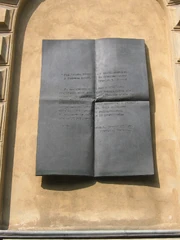
The commemorative plaque at the University of Warsaw for the students demanding freedom of speech in 1968.
Background[]
The Polish 1968 political crisis, also known in Poland as March 1968 or March events (Polish: Marzec 1968; wydarzenia, wypadki marcowe) was a major student and intellectual protest action against the government of the People's Republic of Poland. The economy had been failing for years, prices had risen faster than pay on may occasions and the communist party was getting more authoritarian as time moved on. The 1962 Szczecin military parade accident had further aggravated the situation in Szczecin.
The crappy Polish economy was in it's death throws and a drastic increase in the prices of meat went into effect in 1967 causing much hardship and anger.
The market was further destabilized in 1968 by the rumours of an upcoming currency exchange and the ensuing economic panic, something that East Germans had lived with for years. Work quoters went up, pay went down and meat began to run out. Press censorship went up as well, so intellectual life was badly stifled. Poland's first Secretary Gomułka was a politically fossilised dinosaur, who afraid of all changes.
The boredom of stagnation (a pivotal trait of Polish communist thinking), the mood of hopelessness, fear and lack of career prospects thus generated social conflict.
The disparity between the expectations raised by the Polish October movement of 1956 and the actuality of the "real socialism" life of the 1960s led to mounting frustration.
The event[]
The media started libelling non-compliant individuals from March 11th. The Stalinist and Jewish ("non-Polish") roots of the supposed instigators were "exposed" and most papers printed the anti-Semitic/USSR slander, with the notable exceptions of Polityka and Tygodnik Powszechny.
Mass "spontaneous" rallies at places of employment by intimidated workers and in squares of major cities got going at the same time. The participants demanded that "Students resume their studies, writers their writing", "Zionists go to Zion!", or threatened "We'll tear off the head of the anti-Polish hydra".
The Polish poet, satirist and chess player Janusz Szpotański was formally denounced as an enemy of the state, along with othere both inside and outside of the communist party.
Factory workers across Poland were duress by the state in to informing on protesters and forced to publicly denounce Zionism as the campaign reached it's zenith in the March of 1968, when the anti-Jewish smear campaign,was backed up by process of purging Jewish and other officials, ex-Stalinists, high-ranking rival communists, and moral supporters of the ongoing liberal opposition movement activity, was accelerated.
As the USSR was an alie of Egypt, the Israeli-Arab Six-Day War provided the perfect excuse for Poland and the USSR to indulge in Jew-hating.
Pro-democracy protests hit several urban location including Warsaw, Kraków, Lublin, Gliwice, Wrocław, Gdańsk, Poznań, and Łódź as the political crisis within the authoritarian regime of the Polish United Workers' Party grew.
- Kraków, Lublin, Gliwice, Katowice, Warsaw University and Łódź from March 11th.
- Wrocław, Gdańsk, and Poznań March 12th.
- Kraków University Łódź University and Wrocław University March 13th were formed.
- Wrocław on March 14–16th.
- Kraków and Opole on March 14–20th.
- Atempts to agitate and radicalise industrial workersworking at the the state enterprises in Gdańsk, Wrocław and Kraków's Nowa Huta had little meaningfull effects, but 20,000 students and workers did march and later fought into the late evening against the state security forces of 3,700 officers in Gdańsk on March 15th
On a April 8 Politburo meeting, Stefan Jędrychowski strongly criticized the government's anti-Semitic campaign, but a majority of the participants expressed the opposite view or supported Gomułka's supposed "middle" course, a Sejm session indirectly dealt with the crisis on April 9–11. Znak was the only political organisation in Polish Sejm (parliament) to protest against the ORMO's actions on March the 11th, questioning the brutal anti-student interventions by the police, were really necessary. Zanak was banned from 1976 to 1988.
General Mieczysław Moczar from the Ministry of the Interior and some military leaders among others, took the chance to 'settle with the Jews' and let vent to their anti-Semitic views. A list of 382 "Zionists" was issued to the Ministry on June the 28th and so about 150 Jewish military officers were fired in 1967–68, including Czesław Mankiewicz, national air defence chief. The Polish Minister of Defence, Marian Spychalski, tried to defend Mankiewicz and thus sacked as well. At this time the Ministry of Interior renewed its proposal to ban the Jewish organizations from receiving the Joint Committee foreign contributions.
The Ministry of Public Security to engage in massive expansion of the repressive ORMO police force, which at its peak in 1979 reached over 450,000 members.
Aftermath[]
The anti-Semitic, anti-intellectual and anti-student campaign damaged Poland's reputation abroad, particularly in the West. Many Eastern leaders found it off putting to. General Jaruzelski involved in the successful 1970 plot against Władysław Gomułka, which led to the appointment of Edward Gierek as General Secretary of the Polish United Workers Party. At least 13,000 Poles of Jewish origin emigrated in 1968–72 as a result of being fired from their positions and various other forms of harassment. General Jaruzelski demoted to the rank of private until 1980 and 1,348 Jewish officers who had emigrated, not only around 1968, but later in secret.
The 1970 Polish protests would soon follow. Radio Free Europe/Radio Liberty fed of this and made a lot of anti-Communist party of Poland propaganda out of it!
Also see[]
- 1970 Polish protests
- 1971 Łódź strikes
- Summer 1981 hunger demonstrations in Poland
- 1981 Declaration of Martial Law in Poland
- Bydgoszcz events of March 1981
- The 1981 warning strike in Poland
- 1962 Szczecin military parade accident